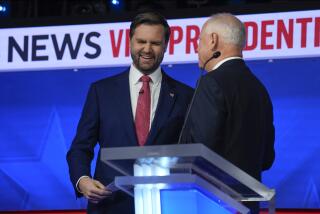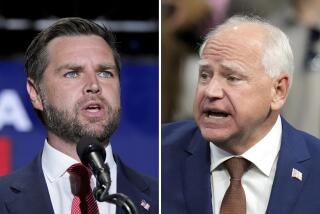Mandela, De Klerk Clash in South Africa TV Debate
- Share via
JOHANNESBURG, South Africa — It wasn’t so much a quarrel as a cat fight when Nelson Mandela and Frederik W. de Klerk, co-winners of the 1993 Nobel Peace Prize, took turns verbally slugging at one another Thursday night in this country’s first televised debate between presidential candidates.
Mandela, in particular, dropped his usually aloof demeanor to lash out with personal attacks and bitter hostility at the white president who freed him from 27 years in prison in 1990 and has worked with him ever since to lead this racially polarized nation from the brutal rule of apartheid to the eve of multiracial democracy.
De Klerk, Mandela repeatedly charged, “is less than candid” and “does not know what he is talking about.” He has “made vague and starry-eyed promises” and heads a party that is “actually promoting racial hatred.”
It was a surprisingly aggressive performance from the 75-year-old icon of the black liberation struggle, especially since polls have shown his African National Congress is headed for a landslide victory over De Klerk’s ruling National Party and 24 smaller parties when the nation’s first all-race elections begin in 11 days.
De Klerk, 58, who is usually the more lively speaker, was repeatedly put on the defensive. He shook his head, frowned and pursed his lips angrily at Mandela’s charges--and the occasional jeers of ANC supporters in the small studio audience. But Mandela clearly kept him off guard.
“I totally reject the accusation that the National Party is racist,” De Klerk said at one point, his face drawn. Later, he added, “This government does not fund murderous activities.”
The 72-minute encounter was broadcast live from the Johannesburg Civic Theater to millions of South Africans and was sent around the world on Cable News Network. An estimated 71% of voters here have access to television, but it was one of the few times TV played a prominent role in the hard-fought race. Political ads have been banned to prevent the few rich parties from dominating the airwaves.
Although up to 17% of voters are reported as undecided, the night’s political impact was difficult to assess in a campaign that has largely broken down along racial lines.
The Independent Electoral Commission, the neutral watchdog group that is running the election, has banned political polls in the last three weeks of the campaign to avoid influencing the estimated 22.7 million eligible voters.
Both candidates were dressed in dark suits and were seated behind podiums carrying their parties’ logos. They were questioned by a moderator and a panel of four journalists.
Mandela clearly aimed to break the regal, statesman-like image that one writer here has called his “Studebaker-era civility.” But except for his fiery sound-bite charges, Mandela was slow, stiff and pedantic.
De Klerk was more polished and controlled, and far less personal in his attacks--perhaps because, as he noted, he will work under Mandela as executive deputy president in a month’s time. Under the constitution, the post goes to the leader of the chief opposition party.
De Klerk opened the debate by appealing “for a balance of power” to stop Mandela from gaining too large a mandate. The ANC has said its goal is to win 67% of the vote, which would give it the legal majority to rewrite the interim constitution without consulting its partners in the so-called government of national unity.
“If any party gets too much power, it will be a bad beginning,” De Klerk said.
But the two clashed when De Klerk was asked about the growing political and criminal violence. South Africa has 10 times the murder rate of the United States and, by Mandela’s account, is the world’s most violent nation.
De Klerk said his government has “taken extensive steps,” but he blamed the ANC for “demonizing” the police and using vigilante squads in the townships to battle their opponents.
Mandela erupted in response. He claimed that he had repeatedly provided De Klerk evidence of police involvement in township violence and was supported by a recent report by the independent Goldstone Commission, which accused three of the country’s most senior police officials of funneling arms to ANC opponents.
“I don’t accept the explanation of the state president,” Mandela snapped. “He has much to explain. He is less than candid in putting facts before the public.”
The two also clashed over more substantive issues. Mandela defended his party’s platform of building 1 million homes, creating 2.5 million jobs, providing free education and other promises, all without raising taxes or borrowing. He said the money would come from more efficient reallocation of the country’s $40-billion annual budget.
But De Klerk denounced the ANC plan as “riddled with that which has failed,” including nationalization, and warned that it would frighten away desperately needed foreign investment.
Although the ANC has said its plan would cost about $11.5 billion over five years, De Klerk announced that it would run to a staggering $20.5 billion in its first year alone. He said it would require a doubling of income and other personal taxes. “The ANC plan is going to cost much more than they indicate,” he said.
Mandela fumed. “This is the reply of a man not used to addressing majority needs. . . . His government is dedicated to the needs of a small minority,” he charged. As De Klerk’s supporters hissed and booed him, he added, “Again I say Mr. De Klerk is less than candid.”
As he has through the campaign, De Klerk repeatedly spoke of the “new National Party,” and said its members had apologized for their odious past. The party has ruled since 1948, when it created a brutal police state to segregate the races.
But Mandela held up a comic book, recently banned by the electoral commission for inflaming racial passions. The National Party has promulgated the comic among mixed-race voters, many of whom fear black rule. Mandela called it “full of scandalous, outrageous, racist allegations.”
Calling for fiscal responsibility, Mandela promised to cut his own salary if elected. It prompted scorn from De Klerk. “If he thinks that the salary of politicians is enough to solve the economic problems of South Africa, he’s in for a big surprise.”
The two also bickered on who was responsible for ending apartheid. After De Klerk took credit for starting the process, Mandela accused him of leading a party that is “even today maintaining apartheid” by spending three times more for education of each white student than for each black.
De Klerk shook his head furiously as Mandela continued his attack, saying that “he (De Klerk) has not built houses for blacks for 10 years.”
Finally, at the end, Mandela reached out and held hands with De Klerk.
After the debate, De Klerk seemed to still be smarting from some of Mandela’s barbs. “I think Mr. Mandela has a strange way of talking to a future partner in his attacks on integrity and in his personal remarks,” he said.
Mandela refused to declare himself the winner. “It was not really a question of the victor or the vanquished,” he said. “It was a question of the exchange of views. We have done that.”
More to Read
Sign up for Essential California
The most important California stories and recommendations in your inbox every morning.
You may occasionally receive promotional content from the Los Angeles Times.














